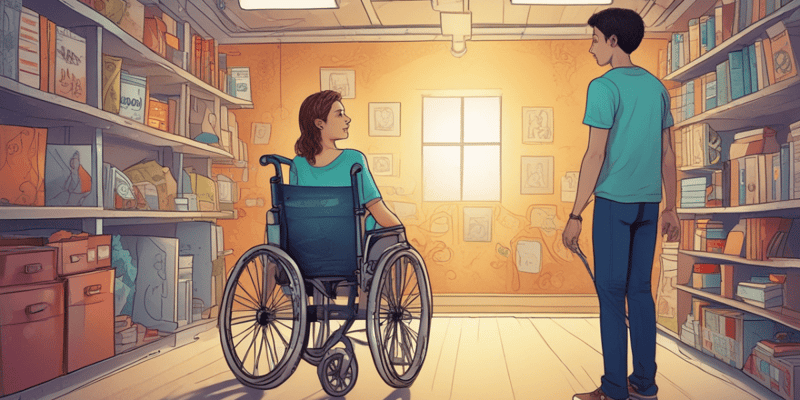Podcast Beta
Questions and Answers
Why is immediate hospitalization necessary for a patient with suspected Guillain-Barré syndrome?
After a spinal cord injury at C5, what activity can the nurse expect the patient to do independently?
What is the term for the deep sleep a patient experiences after a tonic-clonic seizure?
Which of the following best describes the common characteristic of Guillain-Barré syndrome?
Signup and view all the answers
What is the initial nursing intervention for a patient before a medical test?
Signup and view all the answers
After a fall, which position is most appropriate for a patient showing decreased consciousness?
Signup and view all the answers
Which nursing intervention is most helpful for a patient with left-sided weakness who has difficulty swallowing thin liquids?
Signup and view all the answers
When a nurse asks, 'Who is the president of the United States?' during a consciousness assessment, what aspect is being evaluated?
Signup and view all the answers
In assessing a patient using the FOUR coma scale, which categories are the results reported in?
Signup and view all the answers
Which of the following best describes the response pattern assessed when a patient has a slower reaction to stimuli?
Signup and view all the answers
What is the first sign of Bell's Palsy?
Signup and view all the answers
What is the first autonomic event following a stressful or frightening event?
Signup and view all the answers
What action should a nurse take when caring for a child recently diagnosed with bacterial meningitis?
Signup and view all the answers
In which stage of Alzheimer's disease is a patient likely to demonstrate difficulty swallowing?
Signup and view all the answers
What could be a consequence of hypotension?
Signup and view all the answers
Which of the following symptoms indicates a postictal period?
Signup and view all the answers
Which of these conditions may result from marinated foods?
Signup and view all the answers
What do surgical navigational systems assist with?
Signup and view all the answers
What condition is possibly temporary and may resolve after a spinal cord injury?
Signup and view all the answers
Which question would best encourage a patient to describe their neurologic sensations?
Signup and view all the answers
To provide the best visual field for a patient with right hemiplegia, how should the nurse approach the patient?
Signup and view all the answers
What neurological symptom involves the inability to wrinkle the forehead and pucker lips on one side?
Signup and view all the answers
What might a patient with a spinal cord injury at T1 report alongside stiffness and a headache?
Signup and view all the answers
What crucial observation should a nurse monitor in a patient with neurological issues?
Signup and view all the answers
Following a stroke, which statement represents a potential outcome for an 83-year-old patient?
Signup and view all the answers
What is a common cause for hypotension in patients with severe neurological damage?
Signup and view all the answers
What does an inability to speak but the ability to understand indicate in a neurological assessment?
Signup and view all the answers
What is the typical progression of symptoms in a patient showing signs of increasing intracranial pressure?
Signup and view all the answers
Study Notes
Neurological Disorders Overview
- Guillain-Barré syndrome requires immediate hospitalization due to the potential rapid progression to respiratory failure.
- Aging effects on the nervous system do not typically involve significant change in consciousness but may show widening pulse rate and increased systolic blood pressure.
- Spinal cord injury at C5 allows a patient to feed themselves using adaptive equipment, emphasizing the importance of assisting with preparation.
Seizures and Postictal States
- Following a tonic-clonic seizure, patients may enter a postictal period, characterized by deep sleep and confusion.
- Bell's Palsy first manifests as the inability to wrinkle the forehead or pucker lips on the affected side.
Autonomic Nervous System
- The autonomic nervous system maintains homeostasis; an immediate response to stress is a rise in heart rate and secretion of adrenaline.
Bacterial Meningitis
- In children diagnosed with bacterial meningitis, isolation is critical to prevent spread and ensure proper management.
Stroke Stages and Symptoms
- In late-stage Alzheimer's, swallowing difficulties indicate advanced progression of the disease.
- Right hemiplegia post-stroke in a right-handed patient requires communication strategies from the left side to optimize visual field awareness.
Spinal Cord Injury Management
- Flaccid paralysis may be temporary after spinal cord injury, requiring monitoring and support.
- Initial nursing interventions for autonomic dysreflexia include sitting the patient upright and checking blood pressure due to potential worsening symptoms.
Assessment Techniques
- Effective patient interviews about neurological issues should begin with open-ended questions, e.g., "Can you describe the sensation you are having?"
- The FOUR coma scale assesses consciousness based on eye response, brain stem reflexes, motor response, and respiration, resulting in individual scores for thorough evaluation.
Aphasia and Communication
- Expressive aphasia presents as the inability to verbally express thoughts despite understanding spoken words.
Parkinson's Disease Interventions
- To enhance mobility in Parkinson's patients, instruct them to walk with hands behind their back to aid in balance.
Diagnostic Procedures
- An allergy history is essential prior to any diagnostic procedures such as pyelograms to prevent adverse reactions.
Studying That Suits You
Use AI to generate personalized quizzes and flashcards to suit your learning preferences.
Description
Test your knowledge on the care of patients with neurological disorders in this Chapter 54 quiz. With 20 multiple choice questions, you'll explore topics like Guillain-Barré syndrome and other neurological conditions. Prepare to reinforce your understanding and enhance your clinical skills.




